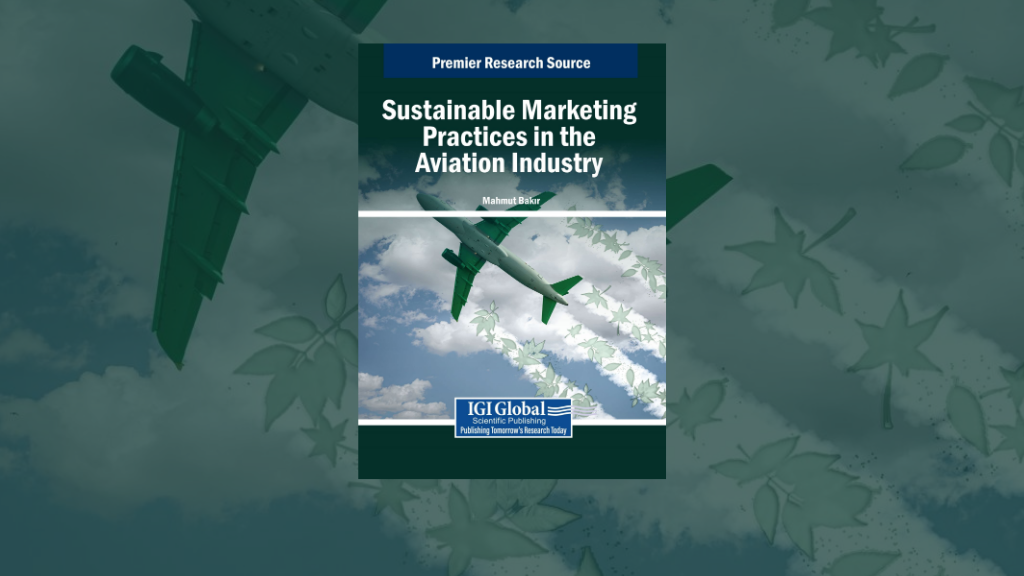Book Review: Sustainable Marketing Practices in the Aviation Industry
Editor: Mahmut Bakır | Publisher: IGI Global | 2025
As the aviation industry faces growing pressure to operate sustainably, a new academic volume provides a much-needed roadmap for marketing professionals navigating this complex landscape. Edited by Dr. Mahmut Bakır, a faculty member at Samsun University with expertise in airline business, service marketing, and consumer behavior, Sustainable Marketing Practices in the Aviation Industry offers timely insights into how sustainability and marketing intersect in air transport.
With academic roots in Civil Aviation Management and a strong background in multivariate analysis and decision-making methods, Dr. Bakır curates 13 chapters from international scholars that collectively examine how the aviation industry is adapting to global sustainability challenges, primarily through the lens of marketing.
A Chapter-by-Chapter Look
The book begins with Chapter 1, which lays the groundwork by analyzing the regulatory frameworks that shape sustainable aviation marketing. It highlights initiatives such as CORSIA and the EU Emissions Trading System, and how these policies drive innovation and influence airline behavior.
Chapter 2 examines how low-cost carriers can also utilize corporate social responsibility (CSR) and sustainability to gain a competitive advantage. With case examples such as Ryanair and Wizz Air, the chapter demonstrates how even budget airlines are strategically integrating green practices.
Chapter 3 presents a case study of Singapore Airlines’ CSR reporting from 2018 to 2024, providing a nuanced view of how the airline’s sustainability messaging has evolved, with a growing emphasis on employee welfare and environmental responsibility.
Returning to the influence of regulation, Chapter 4 focuses on the risks of greenwashing and the growing demand for transparent, authentic communication in sustainability marketing.
Chapter 5 offers a practical roadmap of sustainable marketing strategies that balance environmental commitments with business competitiveness. It’s a valuable guide for aviation firms seeking to appeal to both consumers and stakeholders.
Chapter 6 introduces a quantitative case study from Ethiopia, utilizing structural equation modeling to investigate the impact of green marketing and eco-labeling on enhancing competitiveness, thereby highlighting the credibility and effectiveness of these tools in emerging markets.
Chapter 7 shifts the geographic focus to Portugal, where TAP Air Portugal and Azores Airlines are implementing carbon offset programs and fleet modernization to strengthen their sustainability credentials.
Using Necessary Condition Analysis (NCA), Chapter 8 digs into what drives green purchasing intentions among airline passengers. It identifies key factors, such as perceived value, environmental knowledge, and attitudes, as critical ingredients.
Chapter 9 continues the consumer focus by analyzing the drivers and barriers to sustainable air travel. It reveals insights into why some passengers choose green options while others do not—and how marketing strategies can close that gap.
Chapter 10 examines the emotional dynamics of sustainability messaging. It finds that carefully crafted messages that evoke guilt can increase the likelihood of carbon offset purchases, illustrating the power of emotional marketing.
Chapter 11 provides a closer examination of the impact of greenwashing. Using survey data, it shows how misleading sustainability claims can damage brand trust and loyalty, even if they don’t always affect immediate purchasing decisions.
Chapter 12 shifts attention to European airport service quality in the wake of Istanbul Airport’s launch. Based on Skytrax ratings, this chapter highlights the significance of service touchpoints, including staff interaction and queue management, in enhancing passenger satisfaction.
The final chapter, Chapter 13, applies the Customer-Dominant Logic perspective to sustainability, advocating for a shift away from provider-centric views toward understanding how customers perceive and co-create sustainable value in the aviation industry.
Final Thoughts
Sustainable Marketing Practices in the Aviation Industry is a well-rounded and insightful contribution to the conversation on how marketing can advance environmental responsibility in aviation. With its blend of theory, empirical research, and real-world examples, the book is a must-read for:
- Marketing scholars
- Aviation management professionals
- Sustainability consultants
- Policymakers
- Airline decision-makers
For those working at the intersection of aviation and sustainability, this book offers more than just academic insight it provides practical tools and strategic direction for building a greener, more customer-aligned future for air travel.







